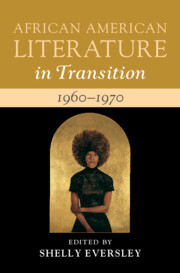Book contents
- African American Literature in Transition, 1960–1970
- African American Literature In Transition
- African American Literature in Transition, 1960–1970
- Copyright page
- Contents
- Contributors
- Preface
- Acknowledgments
- Chronology
- Introduction
- I Poetry and Music
- II Culture and Politics
- III Beyond the Canon
- Index
- References
III - Beyond the Canon
Published online by Cambridge University Press: 10 November 2022
- African American Literature in Transition, 1960–1970
- African American Literature In Transition
- African American Literature in Transition, 1960–1970
- Copyright page
- Contents
- Contributors
- Preface
- Acknowledgments
- Chronology
- Introduction
- I Poetry and Music
- II Culture and Politics
- III Beyond the Canon
- Index
- References
Summary

- Type
- Chapter
- Information
- African American Literature in Transition, 1960–1970Black Art, Politics, and Aesthetics, pp. 227 - 275Publisher: Cambridge University PressPrint publication year: 2022



